Qatar. You may have seen a plane with this name at an airport, or heard something about how it's hosting the World Cup in four years despite the fact that it's a small country in the heart of the Persian Gulf which means it's very hot for a lot of the year. The well-informed among you might know that it's the home of Al Jazeera, which has a bit to do with the fact that since June 2017 it's been blockaded by neighboring countries over foreign policy disputes. (One odd consequence is that 1,000 cows have been airlifted to Qatar to ensure self-sufficiency for milk.)
Anyway, after Pakistan last year, the Qatar meal marked the second year in a row where a Muslim country's Nosh fell on Ramadan. A bit of research revealed that it's not at all obligatory to break the fast with traditional foods, as I found menus for iftar (fast-breaking) specials ranging from Japanese to Italian to even Applebee's. Since pretty much all food is imported — precious little grows in Qatar other than date palms — so is the variety on the plate. (It's also hard to begrudge anyone for wanting an exotic treat after enduring daily fasting during the very long and hot days of mid-May.)
But all the same, there are dishes that, while very similar if not identical to those prepared in neighboring Gulf countries, are indelibly Qatari. Alex, a guest who'd lived in Qatar, helped me pull together a menu, and so we made an iftar-esque meal celebrating the rich flavors and spices that make the cuisine from this part of the world one of my favorites.
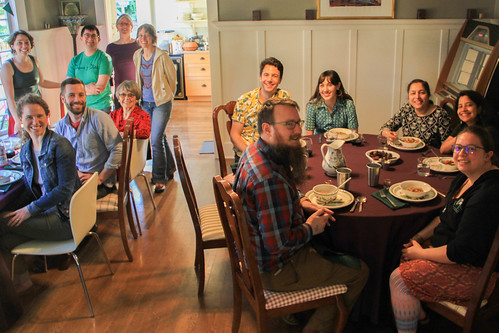
Our crew this evening was Alex, Rachael, Nick, Allison, Melia, Marissa, Kate, Sonu, Chitra, Jessica, and Cheri.
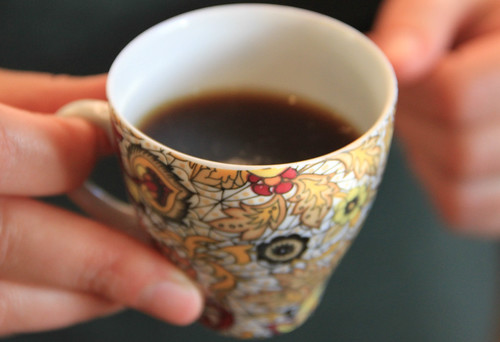
Al-kahwat wal-tamar | Coffee and dates | Recipe (scroll down)
There are so many ways you see coffee made here in Portland, but this one is totally different from what I've experienced. You simmer light-roast espresso grounds in water for as much as 30 minutes, pour through a filter into another pot with ground cardamom, then heat that up and serve. It's really strong and delightfully fragrant and with zero sugar — you nibble on a date for sweetness. (I cheated by serving decaf, but I've found I get more takers for dinnertime drinks if they don't have caffeine.)
Speaking of dates, they're the classic first bite at sundown during Ramadan. They give you a hit of sugar as well as potassium, kind of like nature's Gatorade in solid form. We had two different types: big, meaty, medium-brown, wrinkly, fresh Medjools from California, and a smaller, darker, glossy, soft variety from Iran (!). They were both very good, though the Iranian ones were like I'd never tasted before so I gravitated toward those.
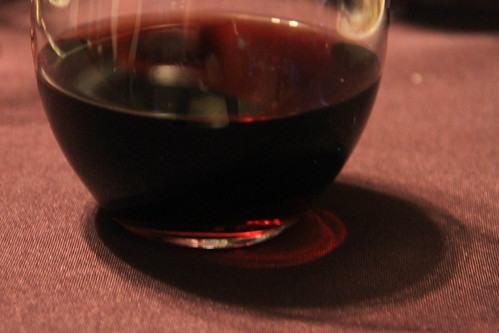
Vimto | Fruit cordial
Nope, that's not wine, it's a drink made from a syrup based on the juices of blackcurrant and black carrot. It's a recipe developed by an English company, yet through the twists and turns of colonialism and globalization, it's become an indelible part of Ramadan for millions around the Gulf. According to Alex, the Qatari government fixes the price of Vimto around Ramadan to prevent price gouging, that's how popular it is. I could see this being a flavor you grow to love when you grow up with it, but I found it fairly odd, almost in the V8 direction thanks to that carrot. I think sparkling water would have helped, but it's typically mixed with still water so that's how we did it.
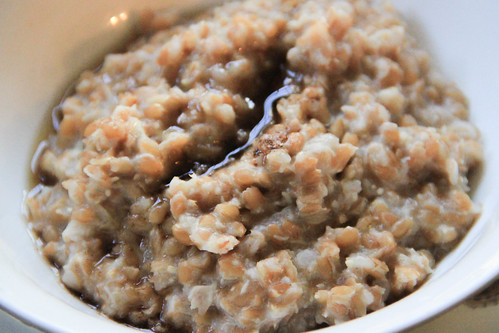
Harees | Wheat and chicken porridge | Recipe
If you thought, "That name sounds like Tunisian harissa but looks nothing like it," you're on to something. What this warm, gentle, nourishing dish and the pungent spicy paste have in common is that they're mashed — for which the root in Arabic is haras.
As with many comfort foods, the recipe can vary widely: lamb is a common substitute for the meat, you can add rice along with the wheat, and sometimes there's a complex assortment of spices thrown in. But I got the sense that a simpler version would do, especially for Ramadan where you've got to ease into eating. The whole wheat grains, soaked overnight and then simmered for hours, provide the complex carbs your body craves and bring with them plenty of moisture, and the chicken is a gentle protein. A drizzle of ghee with some spices — I chose cumin and cinnamon because that sounded tasty to me — adds the flavor. All in all this was a nice dish, and I can see why so many people consider it comfort food. (Note that this recipe makes a lot. I did a 1.5x version, but I would have still had leftovers after serving 12 dishes even with the normal quantity.)
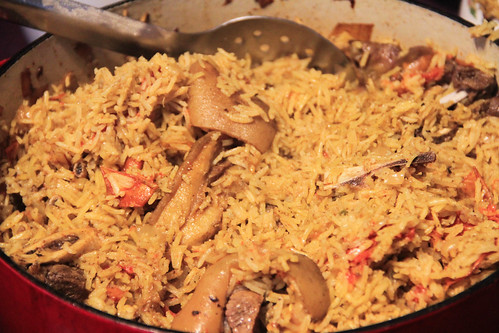
Machboos | Meat with rice | Recipe
As far as I can gather, this fantastically spiced meat-and-rice entree is the national dish. It goes by the same name as what we cooked for Kuwait but is somewhat different — there's nary a split pea to be found here, and this one is less fussy about keeping things separate until combined.
I read plenty of descriptions of the meats you could use, and goat's one of them. I bought a whole goat for the Palestine nosh last year, and was excited to use last remaining bits from the chest freezer for Qatar. Alex confirmed that goat machboos is a legit thing in Qatar, so despite not finding any recipes explicitly calling for it, I took this one calling for chicken and simply cooked the meat much longer.
I expected this to be really tasty. It matched, and perhaps exceeded, my high expectations. It's such an efficient dish, with the rice perfectly absorbing every last bit of broth so you get all the rich flavors of complex spices, of falling-apart goat, and of everything else in every bite. I have three portions' worth of leftovers in the freezer, and am practicing great self restraint by not defrosting and eating one right now as I write.
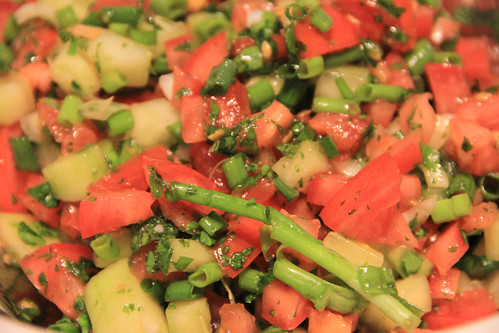
Salatat arabiya | Arabic salad | Recipe
The Middle East's ubiquitous salad is always welcome. What I like about this version is the addition of mint, which makes it particularly refreshing. I don't know if that's necessarily a Qatari thing, or simply that this recipe showed up on a Qatari site, but I like it all the same.
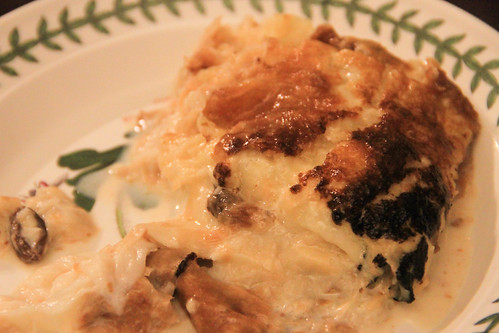
Umm Ali | Puff-pastry casserole | Recipe
Nobody's certain why this dish is called "Ali's Mother," but we do know it originated in Egypt and that it's tasty and incredibly indulgent. Baked puff pastry forms the base, which is then covered with nuts, dried fruit, sweetened milk, and rosewater. A final layer of pastry on top, followed by whipped cream, and ten minutes under the broiler later you've got a heart attack on a plate. With the pastry pre-baked and the ingredients assembled, it was surprisingly easy to whip up at the end of the meal, and it was awesome.